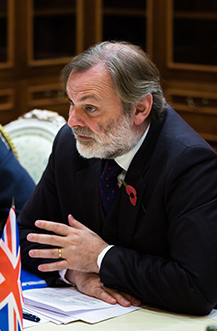Difference between revisions of "Tim Barrow"
(desc) |
m (Text replacement - "e served in" to "e was in") |
||
| Line 30: | Line 30: | ||
Barrow was appointed as [[List of Permanent Representatives of the United Kingdom to the European Union|Permanent Representative]] in January 2017 following the resignation of his predecessor, [[Ivan Rogers|Sir Ivan Rogers]], and played an important role in the [[United Kingdom Brexit negotiations]]. He was responsible on 29 March 2017 for formally [[United Kingdom invocation of Article 50 of the Treaty on European Union|invoking Article 50 of the Treaty on the European Union]] on behalf of the UK. When the United Kingdom left the EU on 31 January 2020, Barrow became HM Ambassador to the European Union. | Barrow was appointed as [[List of Permanent Representatives of the United Kingdom to the European Union|Permanent Representative]] in January 2017 following the resignation of his predecessor, [[Ivan Rogers|Sir Ivan Rogers]], and played an important role in the [[United Kingdom Brexit negotiations]]. He was responsible on 29 March 2017 for formally [[United Kingdom invocation of Article 50 of the Treaty on European Union|invoking Article 50 of the Treaty on the European Union]] on behalf of the UK. When the United Kingdom left the EU on 31 January 2020, Barrow became HM Ambassador to the European Union. | ||
| − | Barrow has been a civil servant in the [[Foreign and Commonwealth Office]] (FCO) since 1986. He | + | Barrow has been a civil servant in the [[Foreign and Commonwealth Office]] (FCO) since 1986. He was in [[London]], [[Kyiv]], [[Moscow]] and [[Brussels]] before his appointment as the [[List of ambassadors of the United Kingdom to Ukraine|British Ambassador to Ukraine]] in 2006. In 2008, he became the Ambassador to the [[Western European Union]] and the UK Representative to the [[Political and Security Committee]]. From 2011 to 2016, he served as the [[List of ambassadors of the United Kingdom to Russia|British Ambassador to Russia]] before returning to London as the FCDO's Political Director, the number two in the department to the [[Permanent Under-Secretary of State for Foreign Affairs]]. |
{{SMWDocs}} | {{SMWDocs}} | ||
==References== | ==References== | ||
{{reflist}} | {{reflist}} | ||
Latest revision as of 03:08, 12 September 2024
(diplomat) | |
|---|---|
 | |
| Born | 15 February 1964 |
| Nationality | British |
| Alma mater | Arnold Lodge School, Warwick School, Brasenose College (Oxford) |
Sir Timothy Earle Barrow KCMG LVO MBE is a British diplomat who was Permanent Representative of the United Kingdom to the European Union from 2017 to 2020 and as the British Ambassador to the European Union from 2020 to 2021.
Barrow was appointed as Permanent Representative in January 2017 following the resignation of his predecessor, Sir Ivan Rogers, and played an important role in the United Kingdom Brexit negotiations. He was responsible on 29 March 2017 for formally invoking Article 50 of the Treaty on the European Union on behalf of the UK. When the United Kingdom left the EU on 31 January 2020, Barrow became HM Ambassador to the European Union.
Barrow has been a civil servant in the Foreign and Commonwealth Office (FCO) since 1986. He was in London, Kyiv, Moscow and Brussels before his appointment as the British Ambassador to Ukraine in 2006. In 2008, he became the Ambassador to the Western European Union and the UK Representative to the Political and Security Committee. From 2011 to 2016, he served as the British Ambassador to Russia before returning to London as the FCDO's Political Director, the number two in the department to the Permanent Under-Secretary of State for Foreign Affairs.
Events Participated in
| Event | Start | End | Location(s) | Description |
|---|---|---|---|---|
| Munich Security Conference/2022 | 18 February 2022 | 20 February 2022 | Germany Munich Bavaria | Slightly less than 1/3 of the 664 of the participants have pages here |
| Munich Security Conference/2024 | 16 February 2024 | 18 February 2024 | Germany Munich Bavaria | Annual conference of mid-level functionaries from the military-industrial complex - politicians, propagandists and lobbyists - in their own bubble, far from the concerns of their subjects |